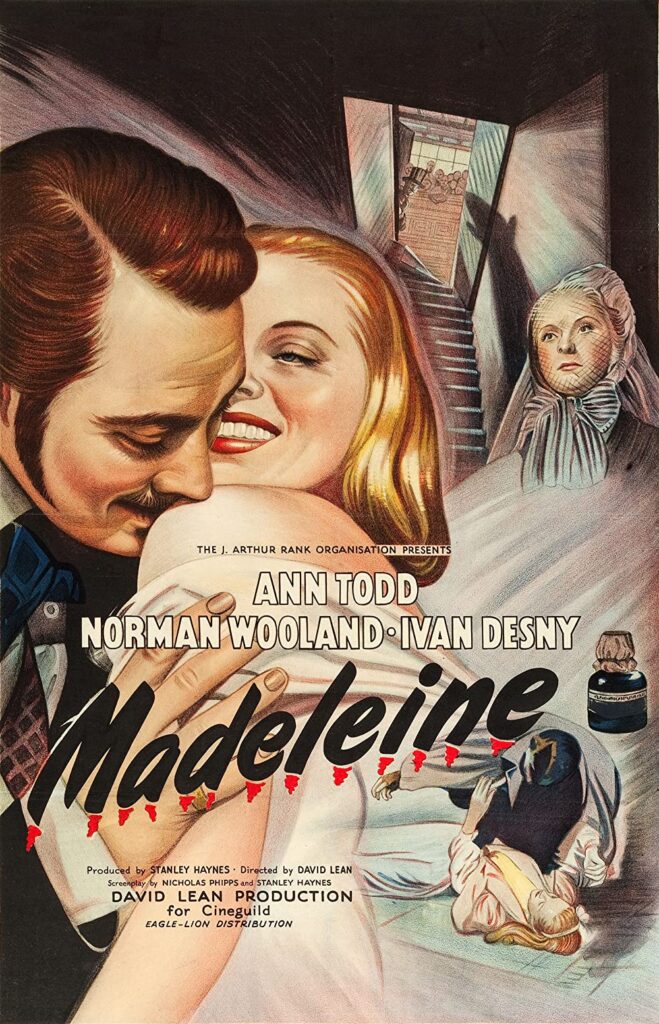
Madeleine (1950)
Madeleine is a 1950 British film noir directed by David Lean, based on a true story of Madeleine Smith, a young Glasgow woman from a wealthy family who was tried in 1857 for the murder of her lover, Emile L’Angelier. The trial was much publicised in the newspapers of the day and labelled “the trial of the century”.
Director – David Lean
Writers – Stanley Haynes (screenplay), Nicholas Phipps (screenplay)
Cast –
Ann Todd as Madeleine Smith
Norman Wooland as William Minnoch
Ivan Desny as Emile L’Angelier
Leslie Banks as Mr. James Smith
Barbara Everest as Mrs. Smith
Susan Stranks as Janet Smith
Patricia Raine as Bessie Smith
Elizabeth Sellars as Christina Hackett
Edward Chapman as Dr. Thompson
Jean Cadell as Mrs. Jenkins
Eugene Deckers as Thuau
André Morell as Defending Counsel
Barry Jones as Prosecuting Counsel
Ivor Barnard as Mr. Murdoch
David Horne as Lord Justice-Clerk
Henry Edwards as Clerk of the Court
Amy Veness as Miss Aiken
Kynaston Reeves as Dr. Penny
Cameron Hall as Dr. Yeoman
Anthony Newley as Chemist’s Assistant (uncredited)
Watch “Madeleine” (1950)
Plot
The film begins at 7 Blythswood Square, Glasgow, in a contemporary setting, then jumps back to the past in the early 19th century.
The film dramatises events leading up to the 1857 trial of an otherwise-respectable young woman, Madeleine Smith (Ann Todd), for the murder of her draper’s-assistant and lover, Frenchman Emile L’Angelier (Ivan Desny). The trial produced the uniquely Scottish verdict of “not proven”, which left Madeleine a free woman. The film begins with the purchase of a house in Glasgow by an upper middle-class Victorian family. Their eldest daughter Madeleine claims the basement bedroom so she will have easy access to the servants’ entrance and be able to entertain her lover, without her family’s knowledge.
The relationship continues and the couple becomes secretly engaged, but L’Angelier begins to press Madeleine to reveal his existence to her father, so they can marry. Frightened of her authoritarian father, Madeleine is reluctant to do so. Eventually, she visits L’Angelier in his room and says she will elope with him, rather than face telling her father. L’Angelier says he could never marry her this way. Madeleine now realises that he loves her not for herself, but only as a means to recover his position in society. She says their relationship is over and demands all her letters be returned.
During the time that Madeleine has been seeing L’Angelier, her father has been encouraging her to accept the attentions of a wealthy society gentleman, William Minnoch (Norman Wooland). After breaking her engagement with L’Angelier, Madeleine tells Mr. Minnoch that she will accept his marriage proposal. Her family is happy, but L’Angelier shows up threatening to show her father the compromising letters in his possession, unless she continues to see him. Saying nothing of her new engagement, Madeleine reluctantly agrees.
Some weeks later, L’Angelier becomes very ill. He recovers, but later suffers a fatal relapse. When the cause of death is proven to be arsenic poisoning, a friend of L’Angelier points the finger of suspicion at Madeleine, who is found to have had arsenic in her possession at the time of L’Angelier’s death. The remainder of the film covers the court case, finishing with the verdict of “not proven”, a uniquely Scottish verdict which releases Madeleine from custody as neither guilty nor not guilty.